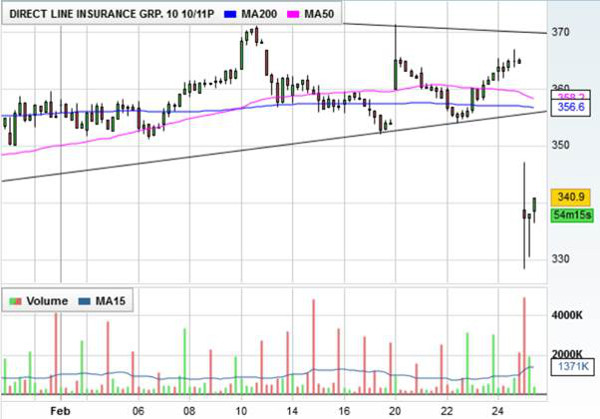Motor claims decision causes stockmarket chaos
27th February 2017 14:09
by Harriet Mann from interactive investor
The insurance industry has been dealt a blow akin to Storm Doris, after the Lord Chancellor decided to slash the discount rate on motor claims from 2.5% to minus 0.75%. While insurers like and scrambled to warn investors this will leave a huge hole in full-year results, one has emerged from the FTSE 350 rubble.
Direct Line shares crashed 10% Monday to their lowest since the post-referendum carnage, with Admiral down as much as 9%, and the pair has managed only a partial recovery. There were savage kneejerk reactions at , , and , too, but all have since bounced back to trade higher.
Last set at 2.5% in 2001 by the then-Lord Chancellor Lord Irvine of Lairg, the Ogden discount rate is based on a three-year average of real yields on index linked gilts. As real yields have fallen over the last 16 years, Lord Chancellor and Secretary of State Liz Truss has now decided to reduce the rate to minus 0.75%.
Courts must consider the discount rate when awarding lump-sum compensation in personal injury cases. As claimants may be financially dependent on any lump sum for long periods, they are legally treated as risk-averse investors. To make up for the extra money claimants could make by investing their lump sum, the discount rate has historically reduced this payout.
Significant implications
"There will clearly be significant implications across the public and private sector," warned Truss Monday. "I recognise the impacts this decision will have on the insurance industry. My Rt. Hon. Friend the Chancellor will meet with insurance industry representatives to discuss the situation," she added.
As the value of claims payouts could soar, so will the price of motor and liability premiums. Insurance broker Towers Watson reckons a minus 0.5% rate would increase prices by as much as 12%. UBS reckons this could be higher, and has warned that further FCA regulation to increase renewal pricing transparency could increase customer churn within the market.
eSure's low-risk business model means profits could fall by as much as £3 million
"We expect this to lead to higher acquisition expense ratios across the industry, although this is beneficial for those trying to grow share," explains analyst Arjan van Veen. "By increasing the payouts for lump sum claims, today's change reduces the relative attraction of capital intensive periodic payment orders (PPOs) to claimants."
This rate change could cause the insurer's market value to slump 8-13%, van Veen warns, although quick pricing adjustment suggested by Admiral could soften this fall to between -5 and -9%.
The analyst adds: "We do think the listed players are better positioned than the rest of the market."
There is no doubt that this is bad news for the big insurers, and names like Direct Line and Admiral rushed out updates this morning. As the cost of personal injury claims will increase, so will the ultimate loss ratio for all business written up to now, some of which won't yet be earned.
Direct Line's pre-tax profit is expected to be £215-£230 million below guidance when the insurer releases its results for 2016. Including the new discount rate in its results, the insurer's Solvency II capital coverage ratio will rise towards the upper end of its 140-180% target, before adjusting for dividends.
The blue-chip's combined operating ratio is also likely to rise by 6% from the 92-95% guidance set before the rate change. A measure of profitability used by the insurance industry, an increase in this ratio above 100% means the company is paying out more money in claims than it is receiving from premiums.

Postponing its full-year results by one week to 8 March, Admiral reckons the impact of settling all claims at this new rate will be £140-£175 million. Full-year reported profit is now likely to be £70-£100 million lower than initially expected, but management still wants to maintain the dividend at 51.5p.
Looking ahead, if market pricing adjusts to reflect this lower rate, "there will be no significant impact on future business and its profitability," says the insurer.
Pre-tax profit at FTSE 250-listed Hastings will be hit by a £20 million charge when full-year results are released on 2 March, although this shouldn't impact any near-term dividend decisions.
eSure's low-risk business model means profits could fall by as much as £3 million and its 2016 solvency position will be in the upper end of its 130-150% risk appetite.
Worth watching now is Frenkel Topping, a provider of independent financial advice to personal injury and clinical negligence victims.
"[The change in discount rate] will also make lump sum awards more attractive to claimants over periodic payments and will also make Frenkel Topping's low risk investment offering more attractive," argues broker finnCap.
"Frenkel Topping's earnings are highly sensitive to accelerating inflows. We expect the shares to reach our 70p price target in the short term."
This article is for information and discussion purposes only and does not form a recommendation to invest or otherwise. The value of an investment may fall. The investments referred to in this article may not be suitable for all investors, and if in doubt, an investor should seek advice from a qualified investment adviser.